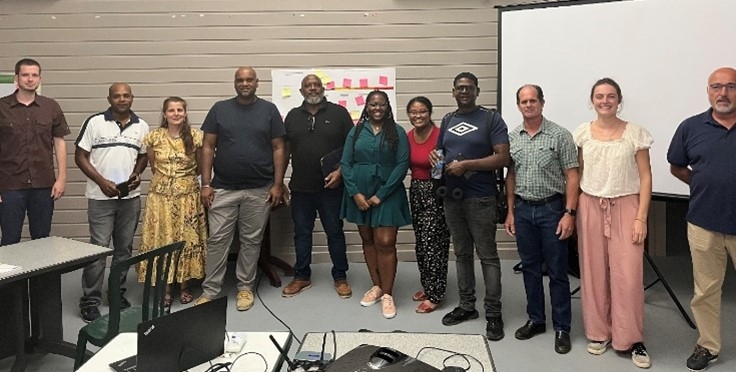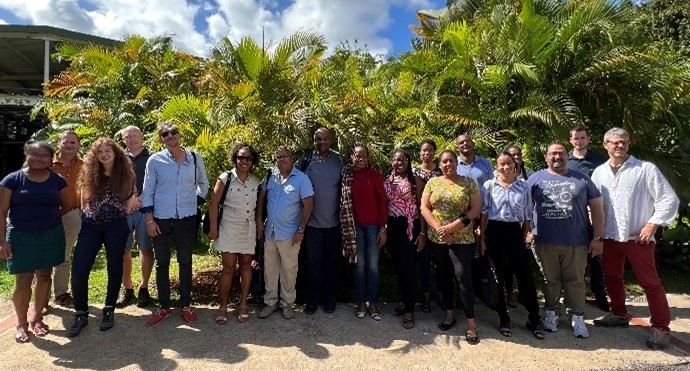Supported by our partner ADEME Guadeloupe (ADEME), our demonstrator focusing on the Guadeloupe Archipelago in France organized end of last year their series of workshop to co-construct adaptation pathways with relevant local stakeholders. Based on the Playbook Methodology, ADEME Guadeloupe conducted workshops separately by key sectors and key stakeholders to be involved. Agriculture and tourism were the two key sectors identified for this territory so that farmers, tour operators and institutional actors of these sectors took part in the workshops.
The first two workshops followed the Playbook approach for the agricultural sector to first co-develop climate change adaptation pathways, but also to contribute to the development of a regional climate change adaptation strategy for Guadeloupe. More specifically, the concrete objective of the four workshops was to co-construct climate change adaptation pathways made up of a sequence of decision points and measures enabling decision-making despite uncertainty in Guadeloupe based on local and scientific expertise.
Agriculture
Starting from the identification and listing of existing hazards that farmers and other actors of the sectors are facing and will face, the participants gather existing solutions and known practices they found relevant. Main identified hazards are:
- Increasing temperature and notably temperature amplitude with impact on evaporation and plant phenology;
- Stronger winds leading to more erosion;
- Sea-level rise, heavy rainfalls and more frequent and stronger cyclones resulting in flooding.
All of these hazards have strong impact on agriculture, all leading to an economic impact for farmers. The common indicators used to discuss the level of impact and define critical threshold was defined as a “loss of economic margin over an average of 3 years”. After defining threshold, participants were invited to define solutions to tackle these different levels. The overview of the different solutions is given in the figure below.

Figure 1. Results of work on indicators, impact levels, critical thresholds, and solutions for adaptation to climate change by impact level for the agricultural sector in Guadeloupe
In a second workshop targeting institutional actors of the same sector, participants build on the results presented above to identify and overcome challenges to the implementation of such adaptation solutions. Stakeholders finally focused on:
- The challenge of disrupting thought: changing agriculture model requires deep modifications on the way we proceed but also the way we think;
- Increasing land availability, notably for young farmers;
- Payments for ecosystem services such as carbon sequestration that can be provided by agroecology and more sustainable practices.
Participants then worked on proposing concrete and appropriate solutions to overcome these challenges with regulatory, pedagogical, and behavioral propositions.
Tourism
In a second round of workshops gathering actors of the tourism sector such as tour operators, participants followed the same approach as for agriculture. The tourism sector in Guadeloupe is particularly exposed to climate change because of the number of tourists who come to visit the archipelago, the nature of tourism which is mainly based on natural heritage, and the predominant model of tourism in the archipelago which is unorganised and therefore relies on local economic activities (agriculture, fishing, etc.). The vulnerability of the Guadeloupean tourism sector to climate change is due to the fact that the sector depends on several factors and is linked to other sectors (agriculture, catering, transport, natural ecosystems, etc.).
Beyond the hazards already identified by agriculture, the main resulting risks for tourism were identified as:
- Degradation of natural landscape, biodiversity and natural resources such as water;
- Risks for human health e.g., water pollution or climate-sensitive diseases;
- Economic and environmental risks for linked sectors such as fishing.
Using the indicator of the loss of annual turnover, they quantified the level of risks and identified solutions to tackle them. The types and examples of different solutions are listed in the overview in the figure below.

Building upon these results, the second workshop identified two main challenges in implementing strong and efficient adaptation solutions to make tourism more resilient:
- The shift from spontaneous to organized access to tourist sites to limit “over-visiting” effects and
- Awareness raising of local communities on the different issues of the sector.
Participants then proposed a range of solutions to address each challenge e.g., through reinforced training of tourism actors on impacts of climate change on their sectors but also impact of tourism on the economy, ecosystems and landscapes. Stakeholders also insists on organizing iconic events such as beach cleaning to raise awareness.
The results of these four workshops will constitute inputs for the next stages of the TransformAr project, particularly in the conduct of biophysical, economic or econometric impact analyses along the project. As they are anchored in the regional dynamics of Guadeloupe, these results could also provide useful information for the definition of a regional strategy for adaptation to climate change. In this sense, ADEME Guadeloupe will communicate these results to the competent authorities. They will also be useful for the preparation of the implementation of climate change adaptation solutions for the Guadeloupe demonstrator in the framework of TransformAr. They will feed the reflections that will be conducted for the implementation of the regional climate change adaptation fund
Learn more about the context and solutions TransformAr aim to deploy in our demonstrator in the dedicated page: Demonstrator #3 – Guadeloupe Archipelago, France
Find out more about the results of the workshops and existing solutions in Guadeloupe with visuals (French) available in our Knowledge Center.






